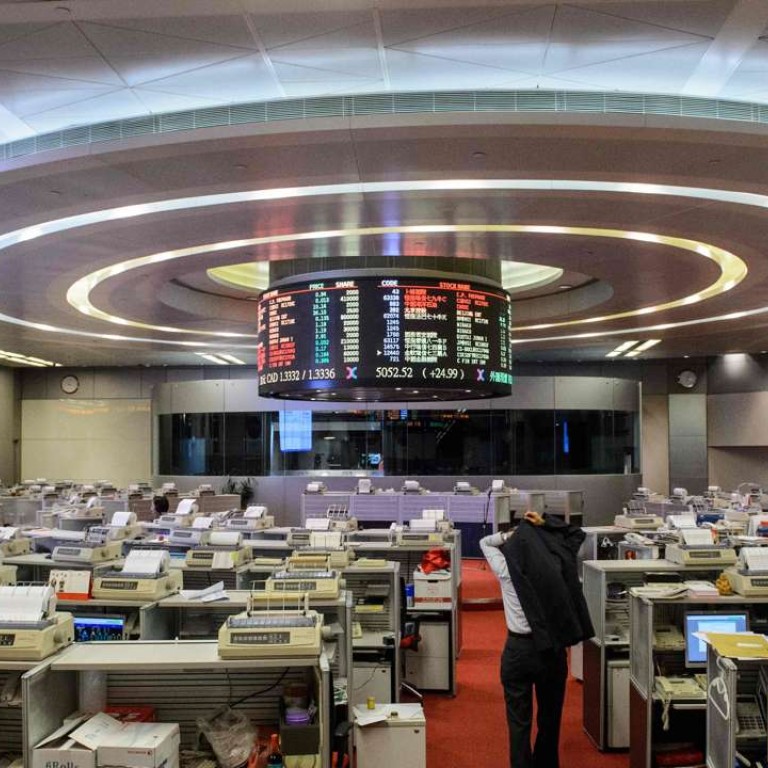
Update | Hong Kong stocks extend win streak to close at a one-month high
Intime Retail Group surges 36 per cent after Alibaba offers to privatise the company in a HK$19.8 billion deal
Hong Kong stocks finished Tuesday at their highest close in a month, extending their winning streak to a fourth session, after data showed China’s producer prices surged the most in over five years, suggesting a better outlook for industrial profits.
The Hang Seng Index gained 0.8 per cent or 186.16 points to close at 22,744.85, the best settlement level since December 9. The Hang Seng China Enterprises index, or the H-share index, added 0.6 per cent or 61.87 points to 9,664.19.
Daily turnover rose to nearly HK$63 billion from Monday’s HK$51 billion.
Gains came after mainland government statistics indicated the producer price index (PPI) surged 5.5 per cent from a year ago in December, beating a 4.5 per cent forecast by analysts in a Reuters survey. It was also the biggest year-on-year increase for the index since September 2011.
The consumer price index (CPI) eased to 2.1 per cent from a year ago in December, slightly below market expectations.
“The upside surprise [in PPI] was largely due to the surge in oil prices towards year-end, which translated into significant price gains in oil and energy sectors,” said Julia Wang, an economist for HSBC Research.
“The industrial sector has been reflating over the past year, and the pace has accelerated towards year-end,” she said.
However, there is little sign of the recovery spreading to the non-industrial part of the Chinese economy, which accounts for over two-thirds of GDP, Wang said.
“Although Hong Kong stocks have risen for several days, we still have reservations about the short-term outlook. We suggest investors not be overly optimistic,” said Linus Yip, an analyst for First Shanghai Securities.
The rebound in Hong Kong stocks was triggered by a slowdown in the yuan’s depreciation pace, he said.
“Nonetheless, it remains to be seen whether capital has flown back to Hong Kong,” he added.
“Investors will also closely watch the scheduled news conference by US president-elect Donald Trump on Wednesday, which could reveal what Trump may do after his inauguration on January 20, ” said analysts from KGI Securities said in a note on Tuesday.
On Tuesday, mainland Chinese stocks closed lower. The Shanghai Composite Index dropped 0.3 per cent to 3,161.67. The CSI 300, which tracks large companies listed in Shanghai and Shenzhen, shed 0.2 per cent to 3,366.09.
The Shenzhen Component Index lost 0.3 per cent to 10,306.34 and the Shenzhen Composite Index lost 0.2 per cent to 1,989.29. The Nasdaq-style ChiNext fell 0.5 per cent to 1,951.68.
Combined turnover for Shanghai and Hong Kong increased slightly to 417.5 billion yuan versus Monday’s 415.4 billion.
Chinese department store operator Intime Retail Group spiked 36 per cent to close at HK$9.54, after Alibaba Group said it would partner with Intime’s founder Shen Guojun to privatise the company in a deal worth up to HK$19.8 billion.
Among other market movers, index heavyweight Tencent Holdings advanced 1.2 per cent to HK$198, Asian life insurer AIA Group climbed 1.9 per cent to HK$46.2, and Hong Kong Exchanges & Clearing, the city’s sole bourse operator, moved up 1 per cent to HK$187.5.
Macau casino shares jumped further after recent gains, with MGM China rising 4.4 per cent to HK$16.08, and SJM Holdings up 3.3 per cent to HK$6.26.
In the mainland, department store operators also shined. Shanghai-listed Hangzhou Jiebai Group, Baida Group, and Shenzhen-traded Chengdu Hongqi Chain were suspended from trading after surging by their 10 per cent daily limit.
Alibaba is the owner of South China Morning Post.


